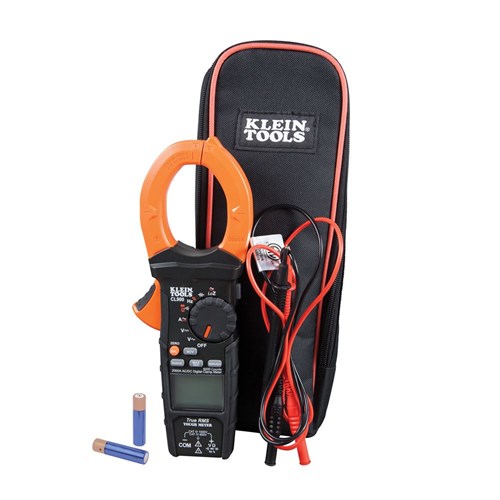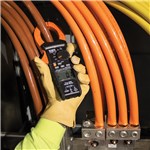Klein Tools, Inc.
Digital Clamp Meter, AC Auto-Range TRMS, Low Impedance (LoZ), 2000 Amp
Item #:
12025-CL900
Product Info
- Digital Clamp Meter measures 2000A AC/DC, 1000V AC/DC, 60 Milliohm
- Rugged Klein “TOUGH METER” industrial design stands up to jobsite demands; built to withstand a 6.6-Foot (2m) drop
- Automatically ranging True Root Mean Squared (TRMS) measurement technology for accuracy
- CAT IV 600V, CAT III 1000V, Class 2, double insulation safety rating
- Backlit display for clear visibility in environments with low ambient lighting
- Dedicated mode for capturing Inrush Current
- Non-contact voltage tester integrated into the clamp
- Low impedance (LoZ) mode for identifying and eliminating ghost or stray voltages
- Audible continuity, capacitance, diode test, frequency and duty cycle, min/max feature, data hold capability
- Test leads measure AC/DC voltage, resistance, continuity, frequency, duty-cycle, capacitance and diodes
The CL900 Electrical Tester is an auto-ranging, true root mean square (TRMS) digital clamp meter. It measures AC/DC current via the clamp and measures AC/DC voltage, resistance, continuity, frequency, duty-cycle, capacitance, and tests diodes via test-leads. It features a Low Impedance (LoZ) mode for identifying and eliminating ghost or stray voltages, and has a dedicated mode for capturing Inrush Current.
⚠ WARNING: Cancer – www.P65Warnings.ca.gov
Item Specifications
-
Measures Current
-
(2) AAA
-
6000µF
-
600A AC, 600A DC
-
6000 Count LCD
-
6.6'
-
1Hz - 500KHz
-
Test leads measure AC/DC voltage, resistance, continuity, frequency and capacitance and tests diodes. Thermocouple probe measures temperature.
-
Carrying Case, 41'' (1041.4 mm) Test Leads, Thermocouple with Adapter, and Batteries
-
IP40
-
1.38
-
ABS/Electronics
-
60MO
-
1.55
-
9.09
-
3.81
-
CAT IV 600V
-
CE Certified
-
-40° - 1000°F
-
1000V AC, 1000V DC
-
1.10 lbs per PC




